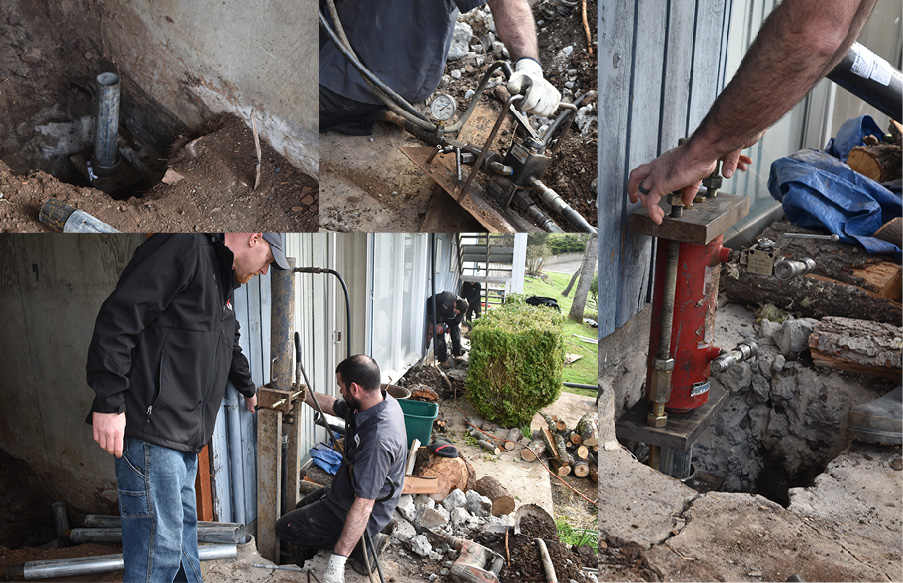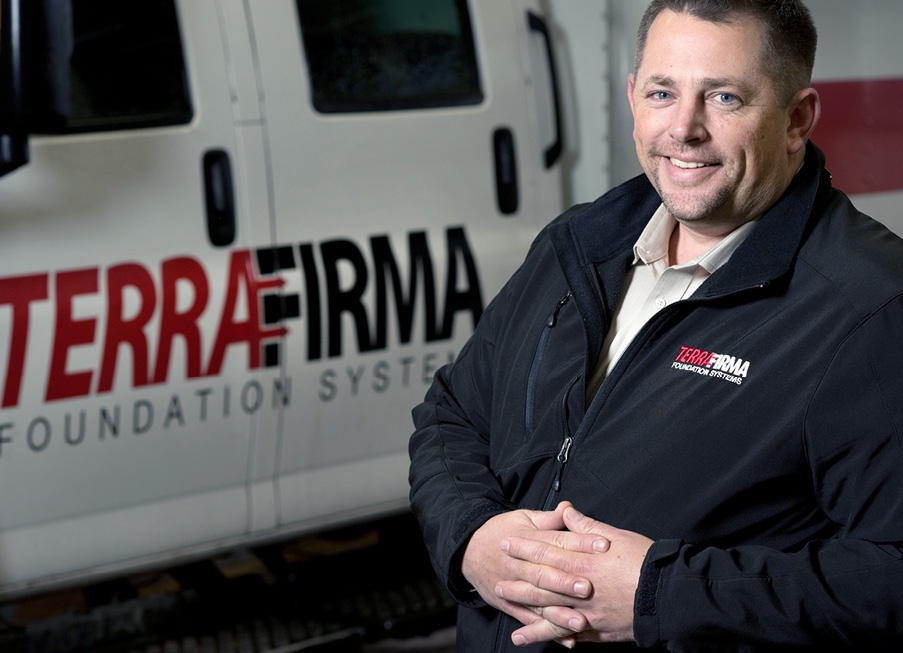TerraFirma Foundation Systems is on a mission to shore up the Pacific Northwest one property at a time.
George Darr knew the problem had gotten bad when he could no longer open up his own back door.
Decades back, Darr and his wife, Cris, had built the house of their dreams in the middle of an open pasture on 40 forested acres near the creek in Willamina, Oregon. They loved that home, and they couldn’t imagine leaving it, ever. But thanks to the seasonal bubbling up of an underground spring, it was slowly but surely sinking into the surrounding earth.
Like any good Pacific Northwesterner, Darr had tackled the issue with a little muscle and a lot of creativity over the years, digging trenches around his home and wedging in timber along the underside of its foundation to prop it up. But these homegrown fixes were no match for the cyclical and increasingly extreme dousing and drying out of the property’s soil.
“It wasn’t a great solution,” says Darr. “It would get wet under there, and this last summer really did it… Over 20 years, we’d done things to shore it up, but finally, that outside door wouldn’t open, and we just gave up.”
A retired engineer, Darr nursed a healthy skepticism of contractors. When it came time to call in assistance, a careful search led him right to the doorstep of fast-growing, Oregon-based structural stabilization company TerraFirma Foundation Systems.
Plenty of Pacific Northwest residents and commercial property owners find themselves locked in (and gradually losing) similar battles against the elements, says TerraFirma owner and president Ryan Beckley.
Uneven sinking, settling and seasonal shifting are perpetual issues, and these problems are compounding as the region’s climate changes, he explains: “It’s not something that will fix itself, and it is not something that will go away. It might not get any worse, it may reach a point where it’s stabilized, but in most cases, if you have bad soil, that’s something you’re going to be dealing with forever.”
Oregon and Washington’s much-maligned annual rainfall tallies are partially to blame, but they’re hardly the sole culprit, Beckley adds: “A lot of people would assume that the rainy season is the time when we see bigger structural issues. It’s actually the opposite. The more prolonged drought we have, the more extreme the foundation issues typically get.”
Over a decade, TerraFirma has perfected a range of warrantied systems and products that counteract the structural dilemmas part and parcel to living in such a climate. To curb the effects of shifting soils, for example, TerraFirma sends workers beneath sinking structures, where they penetrate down into the earth to locate bedrock or another solid surface that can be attached by pier directly to the structure, permanently securing the foundations of homes in trouble.

Top Left: Pier driven to load-bearing strata, waiting for bracket install – Top Right: Project Foremen record and monitor detailed pressures to ensure proper depth to bearing strata is achieved – Bottom Right: Foreman Wes Johnson installing lift jacks to lift the home – Bottom Left: Driving Steel — the pier tube is installed hydraulically. Our unique ram and channel setup allow us to push pier tubes to an acceptable depth. (TerraFirma)
The premise of a long-term remedy definitely appealed to George Darr: “I don’t have to worry about my footings sitting on the ground, because what they’re sitting on is pilings. I could have a swimming pool down there, and it wouldn’t affect those pilings.”
Whether they settle in the city or the country, Pacific Northwesterners like the Darrs often form deep attachments to their homes and communities, says Beckley, and they have no desire to leave them, even when problems arise. Portland homes in particular are often a century old, small in size and seated atop shallow, unfinished cellar spaces instead of full basements. TerraFirma offers in-place solutions for mitigating these deficits, from waterproofing services that fortify a foundation against standing water to crawl-space encapsulation that wicks out humidity and banishes airborne allergens, toxins and pests.
For Portland families looking to expand within tight confines, digging down is often the only option, and TerraFirma is developing a smarter way to do just that. Until recently, the most viable option for expanding downward involved moving out for six months and paying half a million dollars to have one’s home detached from its foundation and jacked up into the air while a new foundation was dug out.
TerraFirma’s cost-effective alternative? A deep foundation-piercing system that drills down into solid strata to attach steel supports, enabling underground excavation and the construction of an entirely new structural perimeter wall in about seven weeks. No relocation is required, and homeowners are left with a legal, seismically retrofitted space to spread out into.
TerraFirma’s products offer addled property owners long-term peace of mind, no matter the issues they’re confronting, promises Beckley: “They have a warranty from a large reputable company, and the problem is solved… They’re not going back and putting Band-Aids on that same problem over and over.”
Today the Darrs are once again sitting pretty in their Willamina house, where all the doors open and close as intended. The creek may rise and the spring may bubble up, says George Darr, but they — and their dream home — will stay firmly rooted to the earth: “We love this place. I want to die here.”



